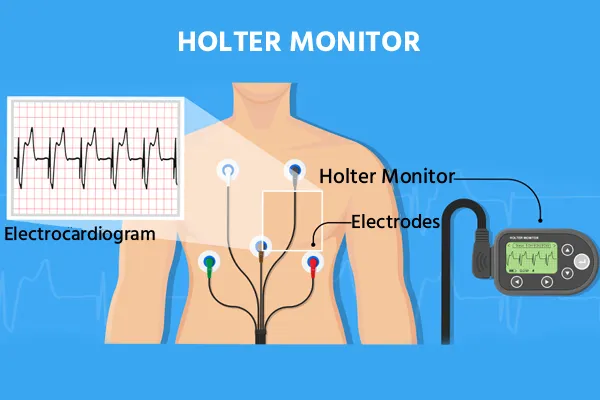Holter Monitoring Test: Purpose and Results
A Holter monitoring is a heart monitoring procedure that looks for abnormalities in the heart rhythm. When standard electrocardiography does not provide enough information, doctors may order 24-hour Holter monitoring to watch for heart rhythm conditions.
Ambulatory electrocardiograms refer to the Holter monitor and other equipment that record your ECG when you go about your daily activities.

Holter Monitoring Test Cost in India:
| Test Type | Portable Electrocardiogram (ECG) |
|---|---|
| Preparation | No special preparation is required. There might be a chance of shaving your chest before the test is performed |
| Report | Within a week or two |
| Holter Monitoring costs in Hyderabad | Rs. 5500 to Rs.6500 approximately. |
| Holter Monitoring costs in Vizag | Rs. 5000 to Rs.6000 approximately. |
| Holter Monitoring costs in Nashik | Rs. 4500 to Rs.5500 approximately |
| Holter Monitoring costs in Aurangabad | Rs. 4000 to Rs.5000 approximately |
| Holter Monitoring costs in Nellore | Rs. 4000 to Rs.5000 approximately |
| Holter Monitoring costs in Chandanagar | Rs. 4000 to Rs.5000 approximately |
| Holter Monitoring costs in Srikakulam | Rs. 4000 to Rs.5000 approximately |
| Holter Monitoring costs in Sangamner | Rs. 4000 to Rs.5000 approximately |
| Holter Monitoring costs in Kurnool | Rs. 5500 to Rs.6500 approximately |
| Holter Monitoring costs in Kakinada | Rs. 7000 to Rs.8000 approximately |
| Holter Monitoring costs in Karimnagar | Rs. 4000 to Rs.5000 approximately |
| Holter Monitoring costs in Nizamabad | Rs. 4000 to Rs.5000 approximately |
| Holter Monitoring costs in Mumbai | Rs. 6000 to Rs.7000 approximately |
| Holter Monitoring costs in Begumpet | Rs. 4500 to Rs.5500 approximately |
| Holter Monitoring costs in Vizianagram | Rs. 4000 to Rs.5000 approximately |
Secure your health with a second opinion. Make informed decisions and book your appointment today!
Get A Second OpinionPurpose of Holter Monitor Test
A Holter monitor test aims to capture the electrical activity of your heart for 24-48 hours (or longer) with the goal of identifying any irregular heart rhythm that does not show up during a normal ECG. The data captured by a portable ECG monitor are quite useful for diagnosing conditions such as arrhythmias, palpitations, and unexplained fainting.
Holter Monitor Test Procedure
While the Holter monitor test procedure, which typically requires you to wear small and seemingly painless electrodes on your chest attached to a portable monitoring device. Here’s how it works:
- Electrode Placement: A healthcare professional places small adhesive electrodes on your chest that are connected to the portable device that you can wear of your waist or shoulder.
- Recording Period: You wear the device for 24 to 48 hours (or longer if needed) doing standard exercise so that it registers your heart activity.
- Log Symptoms: A scratch log for symptoms, particularly dizziness or palpitations, may be requested of you, recording when they occur.
Once the monitoring period ends, you send the device back to the healthcare provider, who reviews the recorded data to evaluate your heart rhythm.
Ready to take control of your health journey? Book your appointment now and start your path towards wellness today!
Book an AppointmentHolter Monitor Test Normal Results
- The average heart rate recorded by a standard Holter Monitor is 84 bpm, although there may be individual variations.
- Holter monitoring also evaluates other parameters, including heart rhythm and the frequency of irregular heartbeats.
- If there are any notable deviations from normal levels or patterns, it is important to consult a doctor for further evaluation and interpretation of the holter monitor test results.
What are the risks of a Holter monitor?
- The Holter monitor provides a convenient method to evaluate heart function with minimal risks that are uncommon.
- Issues may arise in maintaining the attachment of electrodes to the skin, necessitating additional tape and potentially resulting in discomfort upon removal. Prolonged use of electrodes could result in skin irritation or the formation of blisters.
- Certain medical conditions may present added risks; it is advisable to address any concerns with a healthcare professional before utilizing the device.
- Various factors like proximity to magnets, metal detectors, electrical wires, household appliances, and cell phones can disrupt the signals of the monitor; it is recommended to keep them at a distance of at least 6 inches.
- Excessive perspiration might cause leads to become loose or detached, impacting the precision of the monitor's readings.

Frequently Asked Questions
What is the purpose of a Holter monitor?
It is used to detect and assess the risk of heart palpitations (arrhythmias).
Can a Holter monitor identify a blockage?
Yes, these disorders can be diagnosed and characterized using Holter monitors.
Is Holter used to measure blood pressure?
Yes, the device monitors blood pressure fluctuations over 24 hours.
What equipment should a patient be away from while wearing a Holter monitor?
Microwaves, electric blankets, electric toothbrushes, electric razors, and metal detectors should all be avoided.
What can't you do if you're wearing a heart monitor?
Because the device cannot be wet, no showering or swimming is permitted during the testing period.
Is a Holter monitor capable of detecting sleep apnea?
It can detect sleep apnea but is rarely used for regular use.
Will the Holter monitor detect palpitations?
It is used to identify heart palpitations missed by a standard ECG exam.
Can you use deodorant while wearing a Holter monitor?
Please do not apply any creams, lotions, deodorants, or powders to your skin on the day the Holter monitor will be attached to you.
Why must I wear a heart monitor for 30 days?
Wearing the event monitor can assist in determining if you have an abnormal heart rhythm, which is why it needs to be worn for 30 days.
What is the average pulse rate?
Adults have a regular heart rate of 60 to 100 beats per minute.